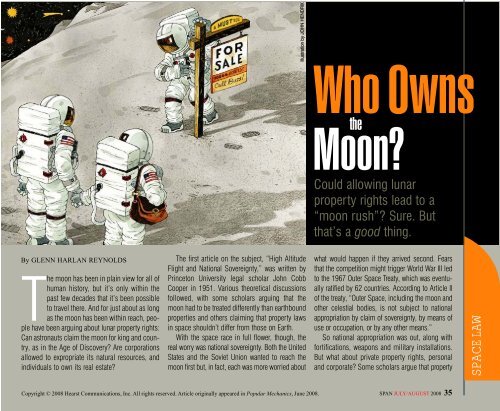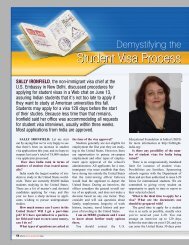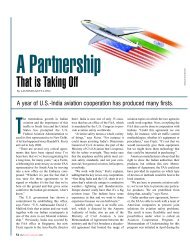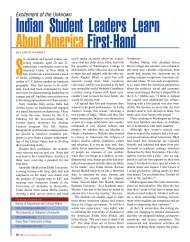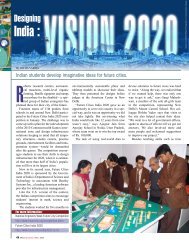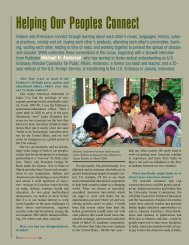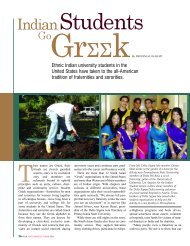Who Owns the Moon?, SPAN July/August 2008
Who Owns the Moon?, SPAN July/August 2008
Who Owns the Moon?, SPAN July/August 2008
Create successful ePaper yourself
Turn your PDF publications into a flip-book with our unique Google optimized e-Paper software.
By GLENN HARLAN REYNOLDS<br />
The moon has been in plain view for all of<br />
human history, but it’s only within <strong>the</strong><br />
past few decades that it’s been possible<br />
to travel <strong>the</strong>re. And for just about as long<br />
as <strong>the</strong> moon has been within reach, people<br />
have been arguing about lunar property rights:<br />
Can astronauts claim <strong>the</strong> moon for king and country,<br />
as in <strong>the</strong> Age of Discovery? Are corporations<br />
allowed to expropriate its natural resources, and<br />
individuals to own its real estate?<br />
The first article on <strong>the</strong> subject, “High Altitude<br />
Flight and National Sovereignty,” was written by<br />
Princeton University legal scholar John Cobb<br />
Cooper in 1951. Various <strong>the</strong>oretical discussions<br />
followed, with some scholars arguing that <strong>the</strong><br />
moon had to be treated differently than earthbound<br />
properties and o<strong>the</strong>rs claiming that property laws<br />
in space shouldn’t differ from those on Earth.<br />
With <strong>the</strong> space race in full flower, though, <strong>the</strong><br />
real worry was national sovereignty. Both <strong>the</strong> United<br />
States and <strong>the</strong> Soviet Union wanted to reach <strong>the</strong><br />
moon first but, in fact, each was more worried about<br />
Copyright © <strong>2008</strong> Hearst Communications, Inc. All rights reserved. Article originally appeared in Popular Mechanics, June <strong>2008</strong>.<br />
Illlusstratioon by JOOHHN HENNDDRRIXX<br />
<strong>Who</strong> <strong>Owns</strong><br />
<strong>the</strong><br />
<strong>Moon</strong>?<br />
Could allowing lunar<br />
property rights lead to a<br />
“moon rush”? Sure. But<br />
that’s a good thing.<br />
what would happen if <strong>the</strong>y arrived second. Fears<br />
that <strong>the</strong> competition might trigger World War III led<br />
to <strong>the</strong> 1967 Outer Space Treaty, which was eventually<br />
ratified by 62 countries. According to Article II<br />
of <strong>the</strong> treaty, “Outer Space, including <strong>the</strong> moon and<br />
o<strong>the</strong>r celestial bodies, is not subject to national<br />
appropriation by claim of sovereignty, by means of<br />
use or occupation, or by any o<strong>the</strong>r means.”<br />
So national appropriation was out, along with<br />
fortifications, weapons and military installations.<br />
But what about private property rights, personal<br />
and corporate? Some scholars argue that property<br />
<strong>SPAN</strong> JULY/AUGUST <strong>2008</strong> 35<br />
SPACE LAW
Above: A kindergarten class poses<br />
with <strong>the</strong> NASA and 50th<br />
Anniversary logos at a celebration<br />
in Barstow, California.<br />
Right: Educators Elysee Bell and<br />
Hea<strong>the</strong>r Burgess with Cosmo, an<br />
inflatable alien figure, display a<br />
chocolate portrait of NASA’s<br />
50th Anniversary logo. The<br />
entirely edible portrait was<br />
created for a Space Week at <strong>the</strong><br />
Robert M. Beren Academy in<br />
Houston, Texas.<br />
rights can exist only under a nation’s dominion,<br />
but most believe that property rights and sovereignty<br />
can be distinct.<br />
In something of an admission that this is <strong>the</strong><br />
case, nations that thought <strong>the</strong> Outer Space Treaty<br />
didn’t go far enough proposed a new agreement,<br />
<strong>the</strong> <strong>Moon</strong> Treaty, in 1979. It explicitly barred private<br />
property rights on <strong>the</strong> moon. It also provided<br />
that any development, extraction and management<br />
of resources would take place under <strong>the</strong><br />
supervision of an international authority that<br />
would divert a share of <strong>the</strong> profits, if any, to developing<br />
countries.<br />
[President Jimmy Carter’s] administration<br />
liked <strong>the</strong> <strong>Moon</strong> Treaty, but space activists, fearful<br />
that <strong>the</strong> sharing requirement would subjugate<br />
American mineral claims to international partners,<br />
pressured <strong>the</strong> U.S. Senate, ensuring that <strong>the</strong><br />
United States didn’t ratify it. Although <strong>the</strong> <strong>Moon</strong><br />
Treaty has entered into force among its 13 signatories,<br />
none of those nations is a space power.<br />
So property rights on <strong>the</strong> moon are still <strong>the</strong><br />
subject of international discussion. But would<br />
anyone buy lunar land? And what would it take to<br />
establish good title?<br />
The answer to <strong>the</strong> first question is clearly<br />
“yes.” Lots of people would buy lunar land—<br />
and, in fact, lots of people have, sort of. Dennis<br />
Hope, owner of Lunar Embassy [which “sells”<br />
36 <strong>SPAN</strong> JULY/AUGUST <strong>2008</strong><br />
property on celestial bodies], says he’s sold 200<br />
million lunar hectares as “novelties.” Each parcel<br />
is about <strong>the</strong> size of a football field and costs $16<br />
to $20. Buyers choose <strong>the</strong> location—except for<br />
<strong>the</strong> Sea of Tranquility and <strong>the</strong> Apollo landing sites,<br />
which Hope has placed off limits.<br />
To convey good title, Hope essentially wrote<br />
<strong>the</strong> United Nations to say he was going to begin<br />
selling lunar property. When <strong>the</strong> U.N. didn’t<br />
respond with an objection, he asserted that this<br />
allowed him to proceed. Although I regard his<br />
claim to good title as dubious, his customers<br />
have created a constituency to recognize his<br />
position. If he sells enough lunar property, it may<br />
become a self-fulfilling prophecy.<br />
So <strong>the</strong>re’s demand, even for iffy titles. But<br />
what would it take to establish title, ra<strong>the</strong>r than<br />
Hope’s approximation? That’s not so clear. In<br />
maritime salvage law, which also deals with property<br />
rights beyond national territory, actually<br />
being <strong>the</strong>re is key: Those who reach a wreck first<br />
and secure <strong>the</strong> property are generally entitled to a<br />
percentage of what <strong>the</strong>y recover. There’s even<br />
some case law allowing that presence to be<br />
robotic ra<strong>the</strong>r than human. Traditionally, claims to<br />
unclaimed property require long-term presence,<br />
effective control and some degree of improvement.<br />
Those aren’t bad rules for lunar property,<br />
ei<strong>the</strong>r. But who would recognize such titles?<br />
50 Years of NASA<br />
On October 1, <strong>the</strong> National Aeronautics<br />
and Space Administration (NASA) will<br />
celebrate 50 years of scientific innovations<br />
and discoveries that are viewed as<br />
icons of human achievement around <strong>the</strong><br />
globe. In recognition of five decades of space<br />
exploration and future challenges, NASA has<br />
put on air shows, art exhibits, open houses at<br />
its field centers, film festivals and discussions<br />
on space exploration. Space enthusiasts,<br />
students, scientists, teachers and art<br />
lovers have participated.<br />
NASA was established by <strong>the</strong> U.S.<br />
Congress in 1958 “to provide for research into<br />
<strong>the</strong> problems of flight within and outside <strong>the</strong><br />
Earth’s atmosphere, and for o<strong>the</strong>r purposes.”<br />
The agency is headquartered in Washington,<br />
D.C., with 10 field centers and o<strong>the</strong>r facilities<br />
across <strong>the</strong> United States.<br />
For more information:<br />
NASA’s 50th anniversary<br />
http://www.nasa.gov<br />
Individual nations might. In <strong>the</strong> 1980 Deep<br />
Seabed Hard Mineral Resources Act, <strong>the</strong> United<br />
States recognized deep-sea mining rights outside<br />
its own territory without claiming sovereignty over<br />
<strong>the</strong> seabed. There’s nothing to stop <strong>the</strong> U.S.<br />
Congress from passing a similar law relating to<br />
<strong>the</strong> moon. For that matter, <strong>the</strong>re’s nothing to stop<br />
o<strong>the</strong>r nations from doing <strong>the</strong> same.<br />
Ideally, title would be recognized by an international<br />
agreement that all nations would<br />
endorse. The 1979 <strong>Moon</strong> Treaty was a flop, but<br />
<strong>the</strong>re’s no reason <strong>the</strong> space powers couldn’t<br />
agree on a new treaty that recognizes property<br />
rights and encourages investment. After all, <strong>the</strong><br />
international climate has warmed to property<br />
rights and capitalism over <strong>the</strong> past 30 years.<br />
I’d like to see something along <strong>the</strong>se lines.<br />
Property rights attract private capital and, with<br />
government space programs stagnating, a lunar<br />
land rush may be just what we need to get things<br />
going again. I’ll take a nice parcel near one of <strong>the</strong><br />
lunar poles, please, with a peak high enough to<br />
get year-round sunlight and some crater bottoms<br />
deep enough to hold ice. Come visit me sometime!<br />
Glenn Harlan Reynolds is a law professor at<br />
<strong>the</strong> University of Tennessee and <strong>the</strong> author<br />
(with Robert P. Merges) of Outer Space:<br />
Problems of Law and Policy.


